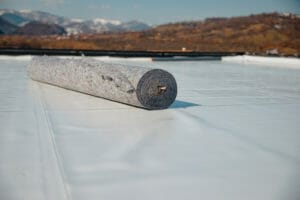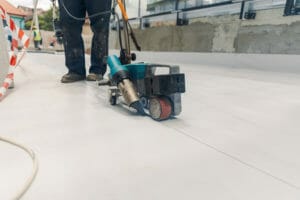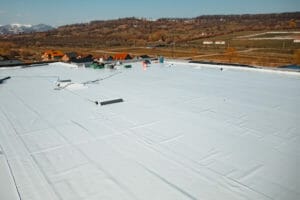When it comes to the roofing of your commercial property, there are many options to consider for your roofing material. To help you make an informed decision, let’s discuss the four main types of single-ply membrane roofing: EPDM, TPO, PVC, and Modified Bitumen. Each material has its own sets of pros and cons and traits that each material possesses and weaknesses that you will want to know about.

EPDM
EPDM, properly ethylene propylene diene monomer, gets its name from the chemicals mixed in various proportions to form it. It’s manufactured in large sheets or rolls and is quick and easy to install, on top of being one of the most inexpensive roofing materials around. EPDM roofing membrane is very lightweight, so the roof deck will not need any reinforcement. And because there are few seams, leaks are rare and a good quality EPDM can last for decades.
Pros
EPDM generally comes in at the lowest price per square foot for flat or low-sloped roofs. Generally, it is long-lasting with a lifespan of over 20 years. And if purchased in white, since it is easily paired with polyiso insulation, it can be a very energy-efficient roof choice.
Cons
Ballasted EPDM systems are relatively inexpensive when compared to others, however fully adhered or mechanical systems are slightly more expensive than TPO. In the wrong environment and toward the end of its life, EPDM can start to become fragile.

TPO
TPO is made up of a single layer of synthetics, usually a blend of polypropylene and ethylene-propylene rubber. Its primary advantage is that it’s typically the lowest material cost for single-ply membrane roofs. It typically comes in white on top, which can help reflect the sun’s light and stop heat buildup within the building. (Learn more about TPO Roofing)
Pros
TPO provides outstanding resistance to ozone, ultraviolet rays, and some chemical exposure at a low cost. It reflects heat radiation better than EPDM and resists mold growth, dirt accumulation, tears impacts, and punctures.
Cons
Heat welding the seams requires a very high-quality installation to hold up over time. Some formulations of TPO may not last much past the 10-year mark, and newer technology makes for a lack of a proven track record.

PVC
PVC is made from a lower percentage of oil and petroleum than TPO or EPDM. Energy-efficient and surprisingly strong, it is installed with a method that allows a PVC roof to expand and contract with a building. PVC can also be sealed with solvent welding and attached to metal flashing and other components with adhesives.
Pros
PVC is highly efficient with heating and cooling, reflects the sun and mitigates the heat island effect in cities, and is recyclable, even after over twenty years of service life. PVC roofs also do not support combustion, burn slowly, are difficult to ignite, and even extinguish the fire if the source is removed.
Cons
PVC typically doesn’t perform as well in cold climates, becoming brittle and cracking or shattering if walked on. In addition, you will need to completely remove your old roof before moving forward in the case of a re-roofing job.

Modified Bitumen
Modified bitumen is made up of polymer reinforced with at least one layer of fabric, either glass fiber, polyester, or both. It’s designed to have the same thickness and physical attributes throughout the entire sheet. Finished roofing membranes can possess multiple bitumen sheets or have a combination of built-up roofing felts and at least one modified bitumen sheet.
Pros
Modified bitumen is versatile because you can add more sheets of polymer material to boost its physical and elemental durability, making roof repairs easier. It’s easy to install, requires little upkeep, and with high energy efficiency, making this roof system an economical winner.
Cons
Additionally, while re-covering an existing modified roof with a single-ply sheet is very cost-effective, installing more than one ply drives up costs quickly. When installing a two- and three-ply system, one is effectively roofing the roof 2 or 3 times.
At The Piedmont Roofing Co. Atlanta, we have years of experience in commercial roofing that will ensure you the job is done as intended the first time. If you’re ready to see what your roofing solutions can look like, schedule an estimate with us today.
